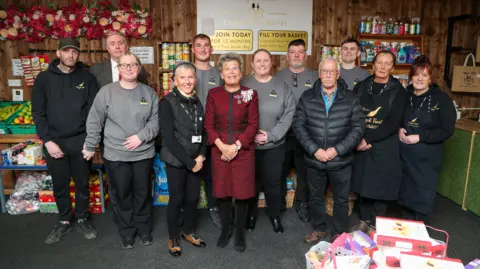'Homeless hub changed my life when I was ill'
 Durham County Council
Durham County CouncilA man said his life changed when a homeless hub welcomed him when he reached crisis point.
Michael Dunn, 41, was taken to the Safe Night Hub in Bishop Auckland, County Durham, while he waited for an assessment from a mental health crisis team and again when he was discharged from hospital.
The hub provides food and support for rough sleepers every night and puts on transport to bring people in need from other parts of the county.
Mr Dunn, who now volunteers at the Kingsway centre twice a week, said the team had been "brilliant" giving him support and practical help.
"They've helped me find a house but the support didn't stop there," he said.
"The aftercare has been brilliant and they regularly call me to see how I'm doing.
"They have changed my life, and I don't know where I would be without them."
The hub, run by homeless charity the Angel Trust, also helped Mr Dunn get a bike and a bus pass.
'Making lasting change'
Commissioned by Durham County Council, it was launched in December and runs from the Angel Trust's base which also has a food bank and community cafe.
Visitors to the hub are offered a hot meal and the chance to wash their clothes and use computers and mobile phones.
A team is on hand to offer advice on housing, mental health, drug and alcohol issues, as well as managing their finances.
Visitors are also offered a flask of hot soup and hand-knitted gloves, hats and scarves.
The charity also works with those in need to find long-term solutions to their problems.
Councillor Alan Shield, who is responsible for equality and inclusion at the county council, said Mr Dunn's story showed why the service was vital.
"It's helping people to access the support they need to make positive and lasting change, empowering them to face the future with confidence," he said.
